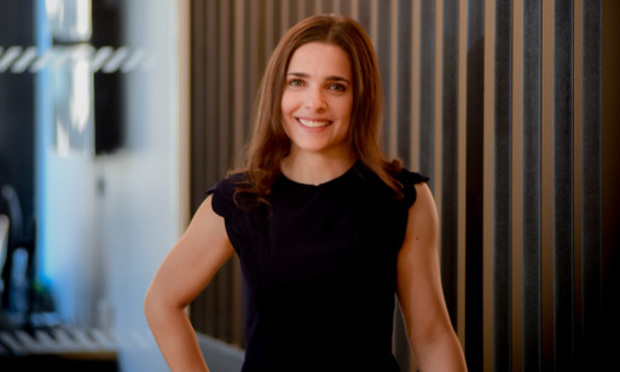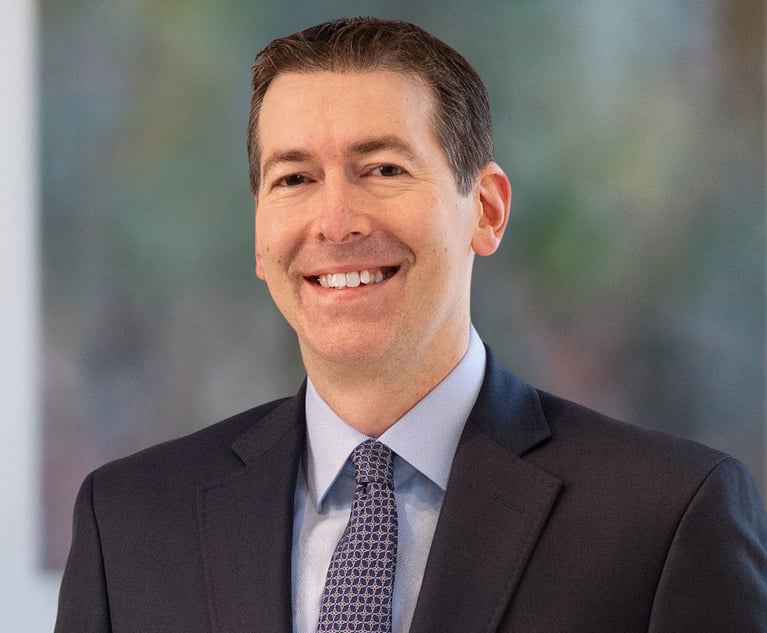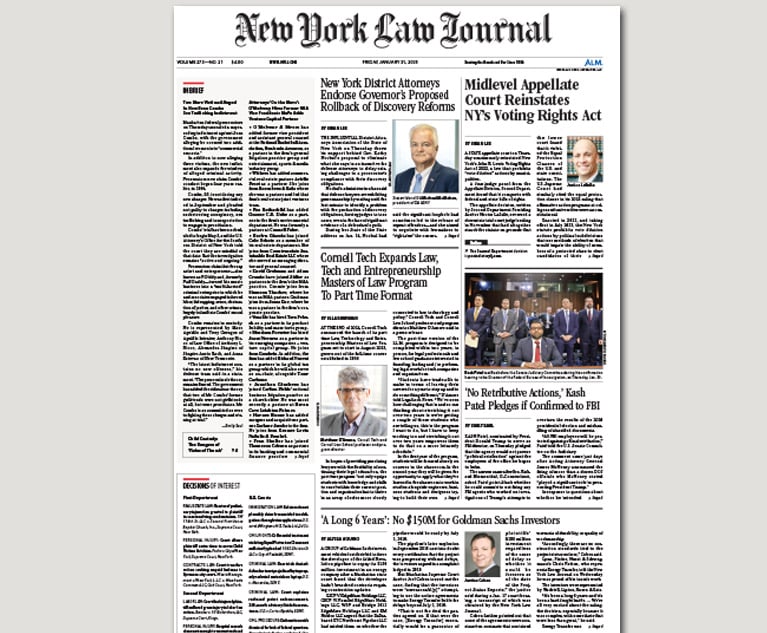GC Impact: Sarah Feingold
"For a small legal team in a highly competitive technology space, we cannot be successful unless we speak the lingo of our colleagues and support a positive company culture."
October 01, 2018 at 02:08 PM
3 minute read
 Photo: David Handschuh/ALM
Photo: David Handschuh/ALM
Sarah Feingold, general counsel, Vroom
Q: How is the role of general counsel evolving, and how have you adapted?
A: A general counsel's practice is “T” shaped. We must know a little bit about all legal areas that impact our client while also being the absolute legal expert on our client. But general counsels can no longer solely focus on law and take the most risk averse route. We have evolved to be legal partners empowering the company to scale, protecting it from liability, and fixing issues. We must understand all aspects of our client's business including its goals and risk profile and budget. Additionally, we must keep on top of the changing legal landscape. And for a small legal team in a highly competitive technology space, we cannot be successful unless we speak the lingo of our colleagues and support a positive company culture. I've adapted by being curious, requesting capped outside counsel fees, and striving to always add value.
Q: How do you find it most effective to develop leadership skills, and to foster them in others?
A: There are five lessons I have learned throughout my career. I use these lessons myself and try to instill them in others at Vroom and via various speaking engagements.
1) Create opportunities – If there is something that needs changing, for you, your career, or your client take responsibility and change it. Become the expert. Volunteer yourself to speak, pitch the article, start the business, create the art, take the class, learn the topic, apply to the job, and reach out to your shero. 2) Welcome “no.” – If you want something, ask. Hearing “no” is proof you tried. Gather strength from your failure lessons. 3) Use all the brains you have and all the brains you can borrow – You are surrounded by teachers. Read the articles, do the research, participate in the conferences, and ask questions to your network. 4) Be kind – To everyone. Period. 5) Say yes – Don't let imposter syndrome get the best of you. When an opportunity overwhelms you, take it (or someone else will).
Q: What is the most effective time-management tool or technique you employ?
A: To take advantage of my time strengths, I block out time for when I'll be the most productive. For example, in the mornings I dive deep into reading contracts, research, and writing. Late afternoons are better for meetings, negotiation, and phone calls. To keep track of all my projects, I use a to-do list, which fits on one piece of paper (in very small print). I review every line and rewrite the list weekly. Email is not my to-do list. I use post-its for ideas and then incorporate them into projects. And like David Allen suggest in “Getting Things Done,” if something can be accomplished in two minutes or less, I do it immediately.
Q: What is your best advice for in-house lawyers trying to make an impact, with their corporate clients and beyond?
A: In-house lawyers must be trusted advisers. They must understand their client's business, goals, budget and risk profile. Although a lawyer's brain may think of all the ways something could be a problem, an in-house lawyer must research the probability of that thing happening and then find a tangible solution that works for the company. Be a collaborative business partner. Always write in plain English, not legalese. And it doesn't hurt to keep candy on your desk.
This content has been archived. It is available through our partners, LexisNexis® and Bloomberg Law.
To view this content, please continue to their sites.
Not a Lexis Subscriber?
Subscribe Now
Not a Bloomberg Law Subscriber?
Subscribe Now
NOT FOR REPRINT
© 2025 ALM Global, LLC, All Rights Reserved. Request academic re-use from www.copyright.com. All other uses, submit a request to [email protected]. For more information visit Asset & Logo Licensing.
You Might Like
View All
Law Firms Expand Scope of Immigration Expertise Amid Blitz of Trump Orders
6 minute read

Orrick Hires Longtime Weil Partner as New Head of Antitrust Litigation
Trending Stories
- 1Uber Files RICO Suit Against Plaintiff-Side Firms Alleging Fraudulent Injury Claims
- 2The Law Firm Disrupted: Scrutinizing the Elephant More Than the Mouse
- 3Inherent Diminished Value Damages Unavailable to 3rd-Party Claimants, Court Says
- 4Pa. Defense Firm Sued by Client Over Ex-Eagles Player's $43.5M Med Mal Win
- 5Losses Mount at Morris Manning, but Departing Ex-Chair Stays Bullish About His Old Firm's Future
Who Got The Work
J. Brugh Lower of Gibbons has entered an appearance for industrial equipment supplier Devco Corporation in a pending trademark infringement lawsuit. The suit, accusing the defendant of selling knock-off Graco products, was filed Dec. 18 in New Jersey District Court by Rivkin Radler on behalf of Graco Inc. and Graco Minnesota. The case, assigned to U.S. District Judge Zahid N. Quraishi, is 3:24-cv-11294, Graco Inc. et al v. Devco Corporation.
Who Got The Work
Rebecca Maller-Stein and Kent A. Yalowitz of Arnold & Porter Kaye Scholer have entered their appearances for Hanaco Venture Capital and its executives, Lior Prosor and David Frankel, in a pending securities lawsuit. The action, filed on Dec. 24 in New York Southern District Court by Zell, Aron & Co. on behalf of Goldeneye Advisors, accuses the defendants of negligently and fraudulently managing the plaintiff's $1 million investment. The case, assigned to U.S. District Judge Vernon S. Broderick, is 1:24-cv-09918, Goldeneye Advisors, LLC v. Hanaco Venture Capital, Ltd. et al.
Who Got The Work
Attorneys from A&O Shearman has stepped in as defense counsel for Toronto-Dominion Bank and other defendants in a pending securities class action. The suit, filed Dec. 11 in New York Southern District Court by Bleichmar Fonti & Auld, accuses the defendants of concealing the bank's 'pervasive' deficiencies in regards to its compliance with the Bank Secrecy Act and the quality of its anti-money laundering controls. The case, assigned to U.S. District Judge Arun Subramanian, is 1:24-cv-09445, Gonzalez v. The Toronto-Dominion Bank et al.
Who Got The Work
Crown Castle International, a Pennsylvania company providing shared communications infrastructure, has turned to Luke D. Wolf of Gordon Rees Scully Mansukhani to fend off a pending breach-of-contract lawsuit. The court action, filed Nov. 25 in Michigan Eastern District Court by Hooper Hathaway PC on behalf of The Town Residences LLC, accuses Crown Castle of failing to transfer approximately $30,000 in utility payments from T-Mobile in breach of a roof-top lease and assignment agreement. The case, assigned to U.S. District Judge Susan K. Declercq, is 2:24-cv-13131, The Town Residences LLC v. T-Mobile US, Inc. et al.
Who Got The Work
Wilfred P. Coronato and Daniel M. Schwartz of McCarter & English have stepped in as defense counsel to Electrolux Home Products Inc. in a pending product liability lawsuit. The court action, filed Nov. 26 in New York Eastern District Court by Poulos Lopiccolo PC and Nagel Rice LLP on behalf of David Stern, alleges that the defendant's refrigerators’ drawers and shelving repeatedly break and fall apart within months after purchase. The case, assigned to U.S. District Judge Joan M. Azrack, is 2:24-cv-08204, Stern v. Electrolux Home Products, Inc.
Featured Firms
Law Offices of Gary Martin Hays & Associates, P.C.
(470) 294-1674
Law Offices of Mark E. Salomone
(857) 444-6468
Smith & Hassler
(713) 739-1250







